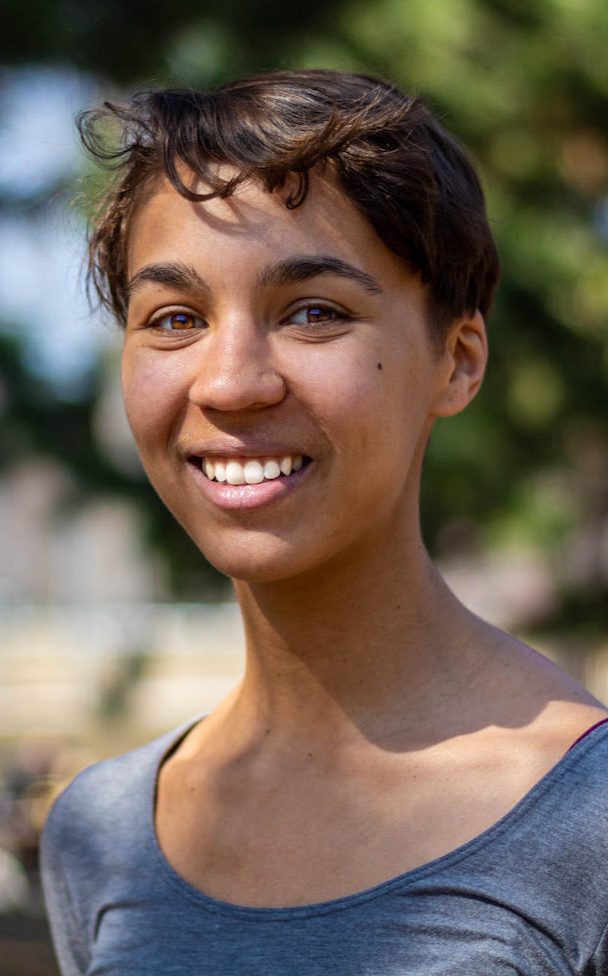Student Portraits
January 10, 2022
IVADO Student Portraits – Maude Lizaire
Our “IVADO Student Portraits” initiative consists of meeting students from our community to share their backgrounds, motivations and ambitions! We sat down with Maude Lizaire, PhD candidate in computing at Université de Montréal.

- Can you tell us a few words about yourself?
My name is Maude Lizaire, and I’m currently studying toward my PhD in computing at Université de Montréal. My thesis director is Professor Guillaume Rabusseau, who is with Mila, the Québec AI Institute. For me, science has always been a way to expand the frontiers of my perceptions. I’m passionate about learning and connecting novel concepts that renew my understanding of the world.
- Tell us about your academic journey.
I’ve always been a “Jill-of-all-trades!” I had majored in environmental sciences at CEGEP after being deeply involved in music until then. At university, I went into physics and mathematics. I continued in experimental physics at the master’s level, studying superconducting materials. I then entered the job market and worked as a materials scientist for a 3D printing startup. Then I had an opportunity to take part in the AI4Good Lab program, which was my introduction to artificial intelligence, and then I was really hooked! That’s what led me to research at Mila, first as an intern and now as a PhD candidate.
- What motivated you to choose digital intelligence?
Working in artificial intelligence gives me the opportunity to expand and make use of my scientific background while fuelling my desire to explore other fields. There are so many applications for AI that it opens the door to collaborations with experts in other disciplines, which I find particularly stimulating. I do have to admit, though, that at first programming was not at all in my wheelhouse! If it hadn’t been for the wise advice of a mentor and the inclusive learning environment at the AI4Good Lab, I probably wouldn’t have taken the plunge.
- What are you working on for your research project?
My research project aims to explore the intersection of three fields: machine learning, formal computing methods, and the theoretical approaches developed in quantum physics. I’m especially interested in tensor network methods, which have been introduced to describe systems involving large numbers of interacting particles. In an analogous manner, an AI model causes a large number of learned parameters to interact with a data set. These models, however, are often perceived as black boxes and can benefit from the guarantees offered by formal methods. By mapping the connections among the three disciplines, we can extract equivalences and use progress made in one to the benefit of the others.
- Any particular qualities that are serving you well for this project?
Because it’s a multidisciplinary project, it’s useful to be comfortable, and to be curious about moving from one subject to another. Also, since I can’t be an expert in multiple fields at the same time, I can’t be afraid to ask questions, surround myself with the right people, and have patience when it comes to the pace of my learning. Finally, given that behind all scientific advances there are people, I find a healthy dose of good will is really useful!
- What are your ambitions for the future?
I have a keen interest in science communication, so I hope to be involved in implementing digital literacy initiatives to democratize this technological knowledge. I think that if we have a better understanding of the potential and the challenges of AI, more needs and issues will be expressed in technological terms by the stakeholder groups directly involved (e.g., the public sector and civil society). To that end, I hope to bridge the gap between the AI expert community and those groups and lead the development of concrete solutions that will serve them.
- Any resources to share?
For graduate students, I heartily recommend the Thèsez-vous? community. It’s a non-profit organization that offers support services and tools for the writing process. It’s been a revelation in terms of countering procrastination and especially meeting some great people!
- What’s your relationship to technology / to digital intelligence?
To be honest, I’m very hesitant when it comes to the pervasiveness of digital technology. It seems to me that all sorts of phone apps are being developed to address problems that could be solved naturally if we just spent less time on our screens 😉 .